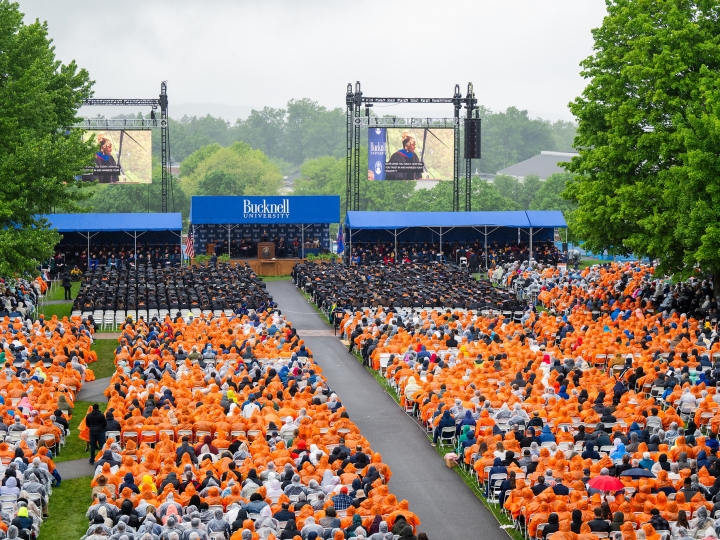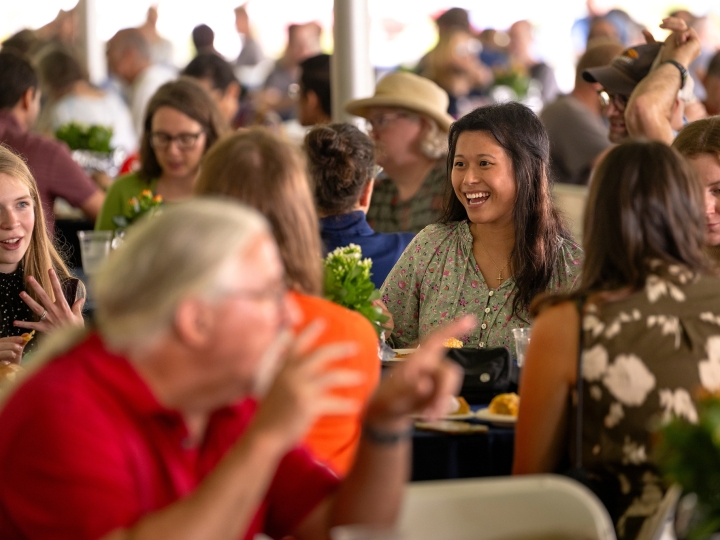Bucknell Honors Outstanding Faculty
May 23, 2024
Six faculty members from across Bucknell's three colleges were recognized during the University's 174th Commencement on May 12 with awards for their excellence in teaching. Each recipient reflects the commitment of Bucknell's faculty to cultivating a dynamic, nurturing environment that prioritizes mentorship and hands-on experiential learning. Nominated by their colleagues and students, these educators have made meaningful contributions to their departments and the University as a whole.
The recipients of Bucknell's 2024 teaching awards are:
Professor Will Kerber, chemistry
William Pierce Boger Jr., M.D. Award for Excellence in Teaching in the Natural Sciences
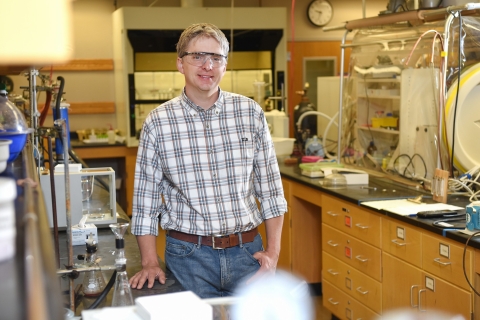
Professor Will Kerber, chemistry, received the William Pierce Boger Jr., M.D. Award for Excellence in Teaching in the Natural Sciences in 2024. Photo by Emily Paine, Marketing & Communications
Throughout his tenure, Kerber has shown his versatility and commitment to student success through various chemistry courses and educational initiatives. Kerber has demonstrated expertise in teaching a wide range of chemistry courses and was instrumental in developing several key courses and adapting his teaching methods to cater to diverse student needs and learning styles. One of his notable contributions is the innovative "labor-based grading" approach he implemented in CHEM 321, which emphasizes understanding over grades. Students have praised this model for facilitating deeper learning and reducing stress. His integration of computational methods into inorganic chemistry labs has enriched students' practical experiences and prepared them for research challenges.
Professor Reggie Gazes, psychology and animal behavior
Class of 1956 Lectureship Award for Inspirational Teaching
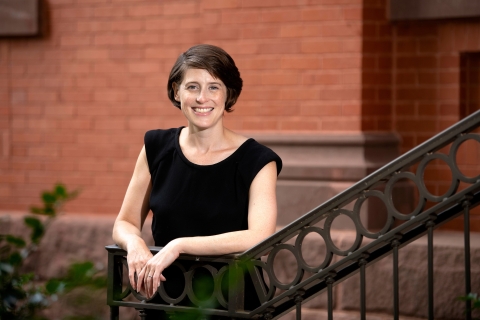
Professor Reggie Gazes, psychology and animal behavior, received the Class of 1956 Lectureship Award for Inspirational Teaching in 2024. Photo by Emily Paine, Marketing & Communications
Gazes prioritizes creating hands-on learning opportunities for her students that enhance their academic and personal development. Gazes' teaching portfolio spans a diverse range of courses from Research Methods in Animal Behavior to SciComm — Communicating Science to Non-scientists. Her commitment to active learning is evident in her innovative teaching methods, which include collaborative assignments with real-life applications, such as training shelter dogs. Beyond the classroom, Gazes is dedicated to mentorship. Through her Primate Training Team and other research opportunities, she enables students to gain valuable experience in experimental design, data analysis and scientific communication. Many of her students have co-authored peer-reviewed papers and presented at conferences under her guidance.
Ryan Snyder, Robert L. Rooke Chair in the Historical & Social Context of Engineering
Christian R. & Mary F. Lindback Award for Distinguished Teaching
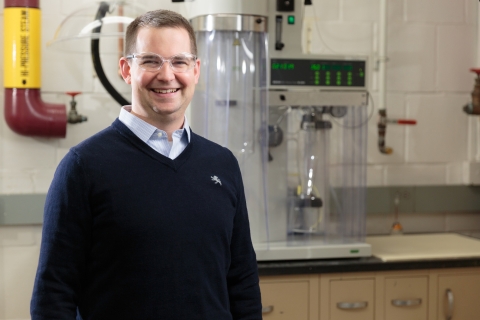
Ryan Snyder, Robert L. Rooke Chair in the Historical & Social Context of Engineering, received the Christian R. & Mary F. Lindback Award for Distinguished Teaching in 2024. Photo by Brett Simpson
Snyder is known among colleagues and students as an outstanding teacher, adviser and leader. His teaching philosophy prioritizes student engagement and real-world relevance. He teaches a wide range of courses that extend beyond the chemical engineering department's core curriculum, which has enabled him to have a positive impact on many students. He helps students develop problem-solving skills, offers students personalized support and integrates ethical and societal considerations into his teaching. Students praise his availability, approachability and willingness to help. Many have credited him with inspiring their career aspirations. Snyder has enhanced opportunities for students to grow their professional networks, participate in national conferences and enhance their career readiness and development.
Professor Erica Delsandro, women's & gender studies
Presidential Award for Teaching Excellence
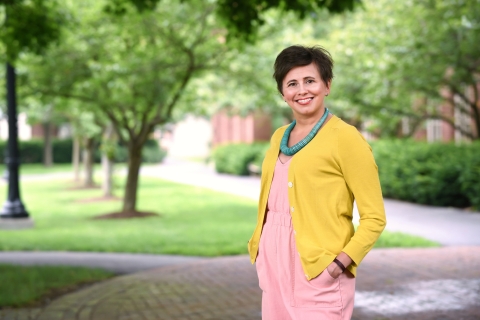
Professor Erica Delsandro, women’s & gender studies, received the Presidential Award for Teaching Excellence in 2024. Photo by Gordon R. Wenzel
Delsandro is known for her dedication to student learning, evidenced by consistently outstanding course evaluations. Her pedagogical approach is marked by clear and inviting syllabi, creative assignments and a commitment to fostering critical thinking and writing skills. Her dedication to teaching writing has had a significant impact on students' abilities. Moreover, her emphasis on diversity, equity and inclusion in course content reflects her commitment to inclusive excellence. Delsandro's empathic approach and investment in students' well-being create a supportive learning environment where students say they feel valued and empowered to challenge themselves intellectually and emotionally.
Professor Kevin Gilmore, civil & environmental engineering
Presidential Award for Teaching Excellence
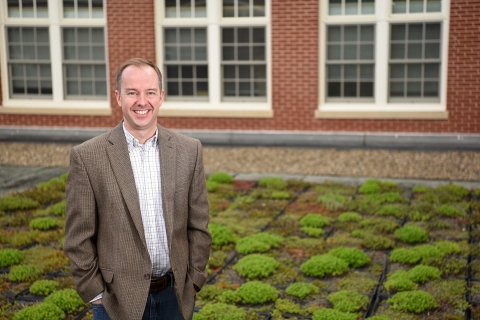
Professor Kevin Gilmore, civil & environmental engineering, received the Presidential Award for Teaching Excellence in 2024. Photo by Emily Paine, Marketing & Communications
Gilmore demonstrates excellence in teaching through his intellectual excitement for his subject matter and students. He is known for infusing current news, regulatory updates and real-world examples into his lectures to foster a dynamic learning environment. He is known for cultivating a supportive classroom culture, where students feel valued and motivated. He's known to be approachable, positive and empathic, listening attentively to students' perspectives and encouraging them to tackle challenges with optimism. Outside the classroom, Gilmore demonstrates a commitment to scholarship and service. He engages students in research projects and has mentored several students as they continued their education in graduate school. He embraces technology and has worked to ensure that he's leveraging it to its fullest to enhance the educational experience for students.
Professor Paul Barba, history
Writing Across the Curriculum Award of Excellence
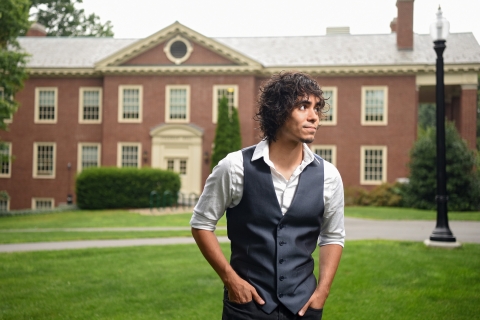
Professor Paul Barba, history, received the Writing Across the Curriculum Award of Excellence. Photo by Emily Paine, Marketing & Communications
Barba's focus on intertwining writing with historical analysis has enabled him to seamlessly integrate writing into the fabric of his courses, making it a critical component of the learning experience for his students. Barba encourages students to embrace the challenges of writing and guides them to discover topics that resonate with them. By encouraging reflective thinking at every stage of the writing process, he cultivates critical thinking skills students need for scholarly growth. He approaches teaching with respect for students' intellect and autonomy and fosters an environment where learning is a collective endeavor.
